The Brain: Meditation, Flow and Literati Art
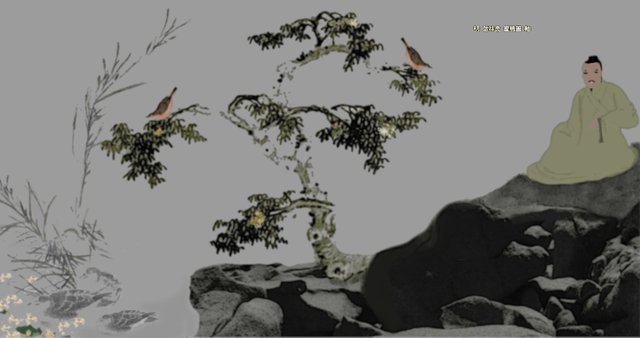
Who doesn't want a better brain, a more productive and creative brain? With the tools of modern science neurologists and psychologists have been trying to understand how we might work toward such a goal. Last week I wrote a blog about neuroconnectivity. I explained that the more creatively engaged we are, the more neuroconnectivity, or plasticity, our brains develop. Besides creative engagement, there are other ways to "grow" our brain. One of these has been around for thousands of years.
Meditation: Good for the Brain
"Fishermen", by Wu Zhen, fourteenth century, Yuan Dynasty, China. Public domain
A study out of the University of Wisconsin looked at the effect meditation has on the brain. In this study, novice, intermediate and advanced meditators were compared. Among the advanced were some Buddhist monks. What the study showed was that the "...regions of the brain that are intimately involved in the control and regulation of attention, such as the prefrontal cortex, were more activated in the long-term practitioners". A perhaps more significant finding was that in the most advanced meditators, there was little change in activity in these areas of the brain at the commencement of a meditation session. The researchers conclude that the brains of these practitioners have essentially been 'trained' so that they can meditate "effortlessly".
"Portrait of Yang Zhui", (excerpt) by Wang Yi and Ni Zan. Fourteenth Century, China, Yuan Dynasty. Public domain
Rick Hanson, a psychologist at UC Berkeley, describes the changes that occur in the brain of habitual meditators. In his article, Self-Directed Neuroplasticity, Mindfulness, Hanson characterizes meditation as "self-directed neuroplasticity", and describes organic changes that are evident in the brains of people who regularly meditate. According to Hanson, the prefrontal cortex of these practiced meditators becomes thicker. He explains that this area of the brain is important for paying attention. Hanson also describes a thickening of the insula, which he explains is important for self-awareness and empathy. He explains that experienced meditators show slower cortical thinning as they age. This effect, according to Hanson, extends to the hippocampus. He also describes an increase in "gamma range brainwaves". This effect seems to enhance neuroplasticity.
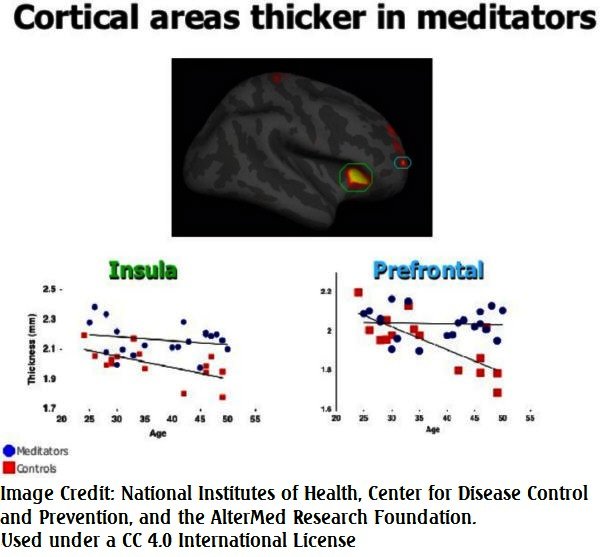
In yet another article, published (2019) in Progress in Brain Research, a group of researchers from Italy came up with a Brain Theory of Meditation, BTM. The researchers enlisted the cooperation of Buddhist monks in their study. The conclusion? "Meditation thus provides a meta-function for an efficient brain/mind regulation, and a flexible allocation of highly limited and often constrained ... brain activity resources..." In other words, meditation allows us to marshal scarce resources and helps us to more efficiently manage the connectivity of different brain areas.
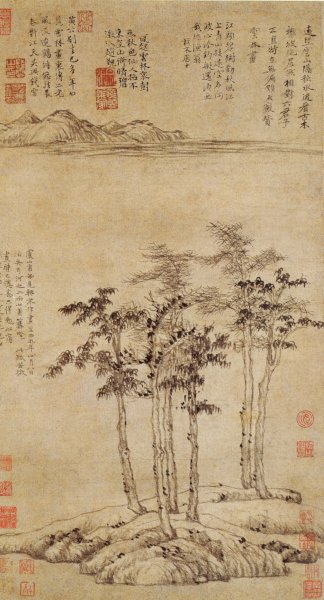
Six Gentlemen, by Ni Zan. China, 1345. Public domain
There is growing acknowledgment and utilization of monks' expertise in understanding the neurological effects of meditation. In 2017, The Atlantic published an article in which the Chair of Psychology at Harvard, Stephen Kosslyn, is quoted as saying, " I want to begin with a declaration of humility in the face of the sheer amount of data that the contemplatives are bringing to modern psychology.”
Literati Art
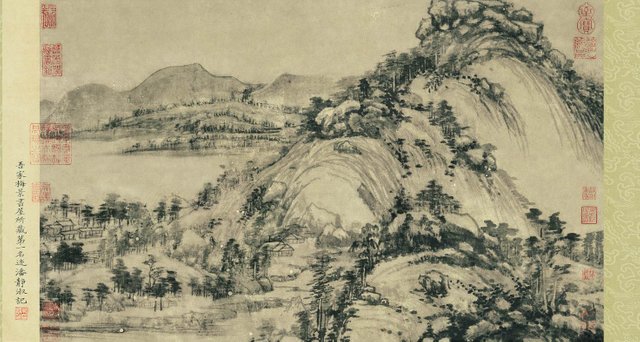
"Dwelling in the Fuchun Mountains"(first half), by Huang Gongwang. 1350, China. Public domain.
In The Chinese Literati on Painting: Su Shih (1037–1101) to Tung Ch’i-ch’ang (1555–1636), author Susan Bush identifies meditation as a distinguishing factor in the Chinese literati artists of the Song Dynasty. This style of painting blossomed in the succeeding Yuan Dynasty. In literati painting, the goal is to represent the idea of something, rather than the physical characteristics of that thing.
Bush quotes one Song-era literati artist, Mi Yu-jen, "Often in quietness I sit in meditation and forget all the worries of the mind and share my wanderings with the emptiness of the blue void."
The most well-known literati painters are probably the Four Master of Yuan--Huang Gongwang, Ni Ze, Wang Meng, and Wu Zhen. These artists painted during the Yuan Dynasty, when Mongols ruled China. The regime was so harsh, that elite Chinese scholars withdrew into lives of seclusion. Each of the Four Masters became, at some point, a Daoist monk. Their contemplative perspective is manifest in their work, particularly in the work of Ni Zan, I believe. He is my favorite of the Four Masters.
Increased Blood Flow in the Anterior Cingular Cortex
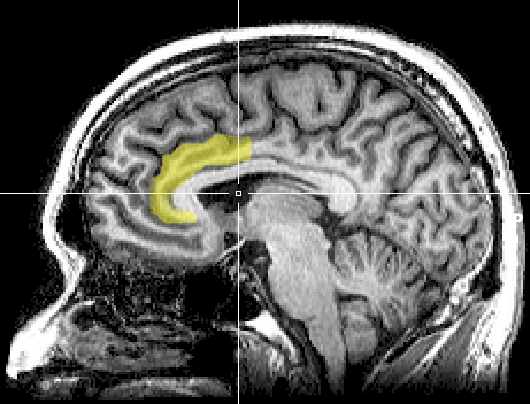
A study, Short-term Meditation Increases Blood Flow in Anterior Cingulate Cortex and Insula, published in Frontiers in Psychology, looked at how short-term meditation affects mood. Half-hour meditation sessions were combined, for five days, with relaxation training. Brain scans traced neural activity of the subjects. There was increased blood flow evident in several areas of the brain: "subgenual/adjacent ventral anterior cingulate cortex (ACC), medial prefrontal cortex and insula". However, this effect was evident in the insula and cingulate cortex only during meditation.
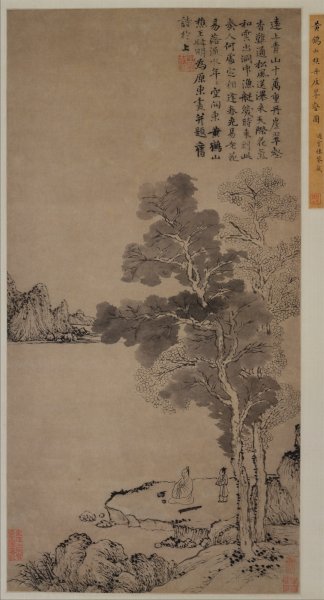
Hanging Scroll, Ink on Paper, by Wang Meng. China, 1367. Public domain.

Emulation in Literati Art and @shaka's Contest
The picture at the top of the page was not made by a literati artist. It was made by me, digitally. It is a pastiche of images taken mostly from the work of literati artists. At the end of this blog, each of these artists will be identified. All work is in the public domain.
Copying or emulating the work of other artists is respected
among the literati. It is believed that the artist who reproduces
work shows character through the use of the brush. And it is character
which is important in literati painting.
How I Came Up with the Idea
China has been much in the news lately, so it was on my mind when I saw @shaka's photo for his #letsmakeacollage contest this week. Also, I wrote a small book on literati art a couple of years ago, so it was natural for me to mine that experience when I started coming up with ideas for my collage.
I've taken a look at some of the other entries for the contest so far, and they are remarkable. Please head over to @shaka's blog and have a look.
@shaka's photo
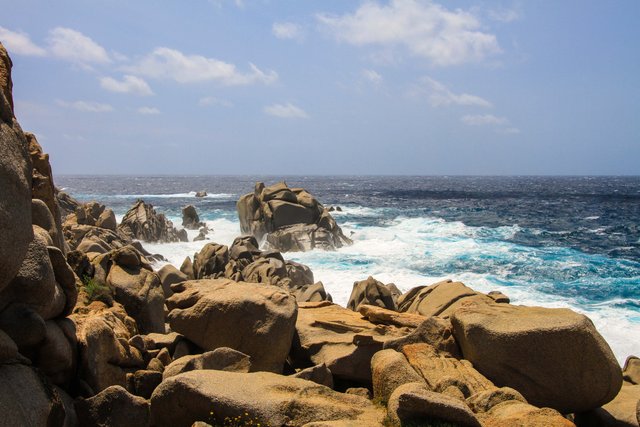.jpg)

Mihaly Csikszentmihaly and the Flow Theory
In 1990, Mihaly Csikszentmihalyi, former head of psychology at the University of Chicago, published a book, "Flow: The Psychology of Optimal Experience". The book became a best seller, and was influential in the psychological community. In his book, Csikszentmihalyi describes 'flow' as a state of such total concentration and focus, that everything else fades away. He explains that not only is achieving a state of flow the path to greater productivity, but it is also the path to happiness.
While some people have called Csikszentmihalyi's Flow Theory, a theory of happiness, others have called it a theory of learning. Still others consider it a theory of work. Edward Hallowell, writing in the Harvard Business Review, for example, explains, "Your goal should be what Mihaly Csikszentmihalyi calls “flow,” the state in which a person is so caught up in what he’s doing that he loses self-consciousness. That is when people perform at their best."
It is said that athletes approach a state of 'flow' when they're in what they describe as a 'zone'. They are so completely absorbed in the task that nothing else matters, or even exists for them, in that moment of intense concentration.
By the way, if you glance back a couple of paragraphs and read Mi Ju-jen's description of his artistic process, it sounds a lot like Csikszentmihalyi's 'flow'.
My Collage
I was definitely in a state of 'flow' as I constructed my Homage to Literati. Here are the separate pieces:
Ni_Zan_Portrai_Yuan, unknown author. China, Yuan Dynasty (approximately fourteenth century). Public domain
Lotus Flowers

Pink and White Lotus, unknown artist. China, Yuan Dynasty. Public domain.
Tree
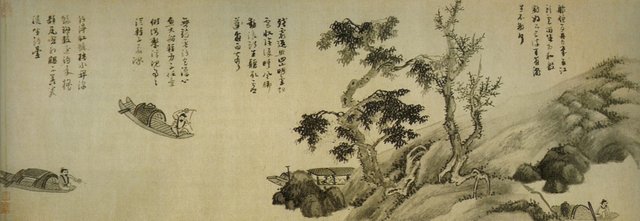
Fishermen, by Wu Zhen. China, fourteenth century. Public domain.
Birds
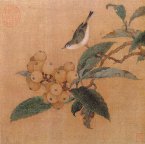
Loquats and Mountain Bird, by anonymous. China, fourteenth century. Public domain.
Ducks, Reeds and Chinese Characters
Ducks and Reeds, by Lin Liang. China, fifteenth century. Public domain.
Chrysanthemums
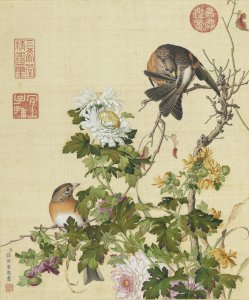
Xian'e Changchun Album 08, by Guiseppe Castilione. Between 1722-1725. Public domain.
And of course, @shaka's original picture
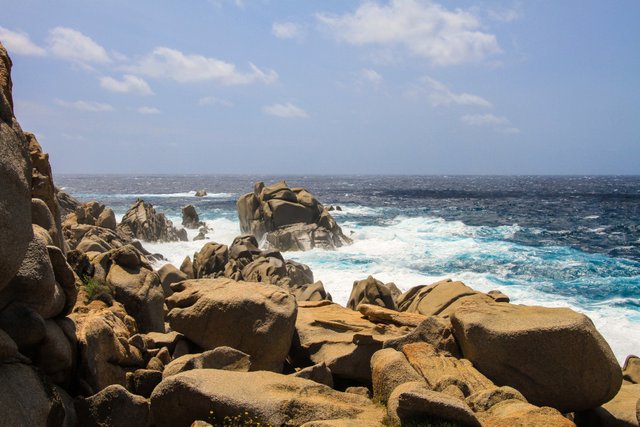
It all comes together :) in
Homage to Literati
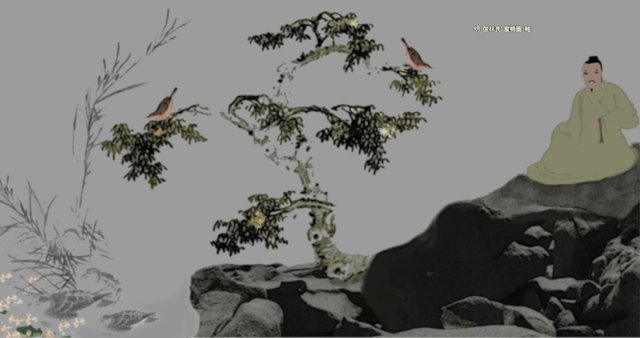

Some Resources Used in Writing This Blog
Center for Healthy Minds, University of Wisconsin: *Brain Scans Show Meditation Changes Minds, Increases Attention
Annual Review of Neuroscience,Mechanisms of Gamma Oscillations
Progress in Brain Research Toward a Brain Theory of Meditation
The Atlantic, Buddhism and Neuroscience
*The Chinese Literati on Painting: Su Shih (1037–1101) to Tung Ch’i-ch’ang (1555–1636)*
Frontiers in Psychology, Short-term meditation increases blood flow in anterior cingulate cortex and insula
Carleton College, Ancient Masters in Modern Styles
Claremont Graduate University, Mihaly Csikszentmihalyi
John Spencer, Five Ways to Boost Student Engagement with Flow Theory
Edward Hallowell, Harvard Business Review
Athletes Insight, [The Zone: Evidence of a Universal Phenomenon for Athletes Across Sports] (http://www.athleticinsight.com/Vol1Iss3/Empirical_Zone.htm)
Sci 2 Art, Eric Kandel: Understanding the Unconscious in Art, Mind, and Brain
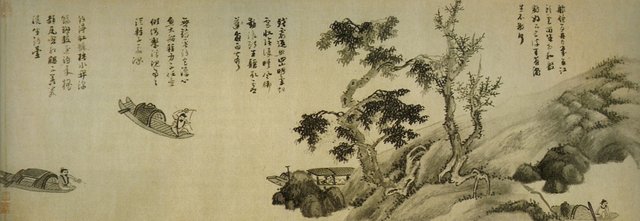

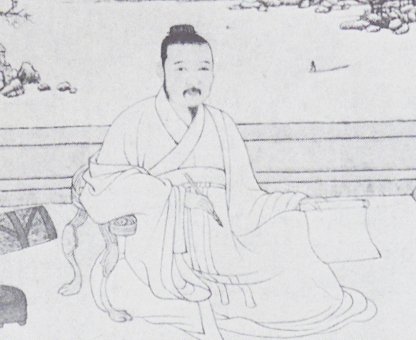
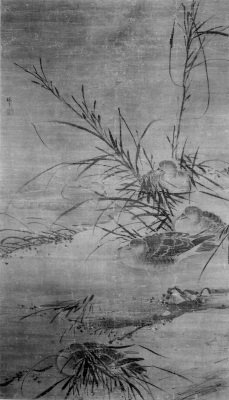
To surrender to the flow and to be in a creative process is very enriching. When I look holes in the air in the morning silence and manage to think little, I have some creative ideas that I want to follow. I don't meditate according to the standards of the scientific findings you describe and which have been acknowledged by now, but I have my joy with it. Deep concentration on a creative process is perhaps the little sister of meditation. Patience and slowness are part of it for me.
I recognize your joy in what you do with the collages and how it lets you play.
Art, I think, has always been a part of humanity where the endless thought revolves around itself, not takes place. One is more concerned with getting involved with the work of art than with other distractions.
I really like the transformation of this image provided by Shaka into your creation.
My dear friend, Erika. You found my post on art and meditation. It must be that you influenced me, because you were in my mind as I wrote this. You are more practice than I am at separating yourself from the Western, goal-oriented perspective. Fortunately, I'm lazy, so am inclined to simply drift into reverie. My mind is really good at that. It's not the same as focused meditation, but it takes me away. Sometimes my husband shakes his head because I'm so far away. But I think it's one of the things that first drew him to me. He is so dramatically practical that I'm refreshing.
Yes, art is a free sphere. You don't have to be "good", just appreciate it, and do it. Nothing 'Western' about that.
Thank you for visiting and for your thoughtful comment.
Take care, be peaceful,
AG
This post has been voted on by the SteemSTEM curation team and voting trail. It is elligible for support from @curie and @utopian-io.
If you appreciate the work we are doing, then consider supporting our witness stem.witness. Additional witness support to the curie witness and utopian-io witness would be appreciated as well.
For additional information please join us on the SteemSTEM discord and to get to know the rest of the community!
Thanks for having added @steemstem as a beneficiary to your post. This granted you a stronger support from SteemSTEM.
Please consider using the steemstem.io app to get a stronger support.
Thank you SteemSTEM! I did post on steemstem.io. This is one of the best communities, if not the best, on Steemit, in my experience.
Hey agmoore2,
now I'm back at home and had some time for reading. Once more this article is perfectly made. It's well researched, informative, entertaining and has your special vivid attitude.
Maybe one question: Do you know how to start meditating?
I want to try this. Maybe I can improve my performance.
Or at least become a bit more relaxed.
Let's see
Best
Chapper
I'm afraid I have a restless mind. Sometimes I think I need anchors to hold it in place. My ambition also is to try meditation. All the best minds, and hearts, do it.
I think it might be a mistake to have the goal of improving performance. That's a very Western perspective, and it's likely I am also afflicted. To meditate properly, I think there should be no goal but the thing itself. That's hard if you are a goal-oriented person. We have to strive to get away from that, because, after all, where are we going? :))
Once again, you've influenced me (as with the book). Today I will start. Maybe you can, also, put a few moments aside, begin modestly. Good luck, to both of us :)
Happiness and peace,
Regards, AG
You are right. We have to learn more from these old masters. Meditating is probably more than the practice itself, it goes very deep to the principles of life.
Nevertheless, if you find some "meditation manuals" post it, please.
You can try this: https://www.tenpercent.com/
Hi @alexander.alexis,
Wow! Those people certainly look happy. I hesitate to "download". My son has me paranoid about bad actors in cyberspace. I'm smart enough to know I'm ignorant, so I listen to him. But only about computers :))
You're right I don't download either. But this specific one is made by a person who's a famous US TV anchor who had a very live (on air) meltdown, so I guess he can be trusted! I did the web version here but it's retired apparently: https://api.changecollective.com/courses/10%25-happier
You can also search for 'headspace' or a guided Sam Harris meditation on youtube.
Thank you so much! I can always use more peace in my life :) And there is certainly space in my head 😁
Have a wonderful, peaceful day, @alexander.alexis
Thank you! Do you also have something which is less 'interactive'?😉
Posted using Partiko Android
See my reply to agmoore above, though I don't know exactly what you mean by less interactive. There's books about meditation but you might waste time on something that is, by most accounts, a very simple and basic procedure.
Oh a book is cool! Thanks for this. Best Chapper
Posted using Partiko Android
I'm going to look. That's a great idea :)
Hi @agmoore2!
Your post was upvoted by Utopian.io in cooperation with @steemstem - supporting knowledge, innovation and technological advancement on the Steem Blockchain.
Contribute to Open Source with utopian.io
Learn how to contribute on our website and join the new open source economy.
Want to chat? Join the Utopian Community on Discord https://discord.gg/h52nFrV
Thank you. Your support and acknowledgement is greatly appreciated!
Aparte de realizar nuestro trabajo aquí, estamos ejercitando nuestro cerebro, desarrollando esa parte del cerebro que nos permite cada vez ser mas creativo, no hace falta ser inteligente, con unos minutos meditando se pueden lograr grandes obras. Yo tengo un SPA y doy masaje, por eso tengo que estar meditando y estar en paz interior para poder sanar. Venezuela esta en crisis pero siempre doy lo mejor de mi, y logro estar en paz interior. Que viva meditar y la creatividad.
Yes, may we meditate and be creative!
I do admire your ability to remain calm and centered in a circumstance of external distress. I don't meditate--my mind is always racing, always full of ideas. Perhaps it would be good for me to meditate. I think I enjoy #shaka's contest so much because it is a kind of meditation. I focus on the picture and everything else falls away.
I hope you and your children are well and happy. And I hope you win this contest :)
Estamos bien, ellas son mis ahijadas (godson) no tengo hijos.. pero ellas son mis consentidas.
Hey @agmoore2,
I haven't recognized your new science article. Right now I'm @ work. Will take care of it when I'm back @ home.
Thanks & Regards
Chapper
Thanks so much for stopping by. My book came! This should be fun...much better than reading articles on the Internet.
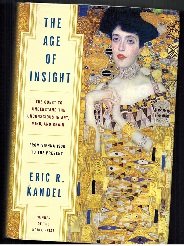
Oh now I see! It wasn't shown in my partiko app on mobile phone.
Good choice!
;-)
Thank you for bringing Kandel to my attention. Sometimes we're asked, if we could bring one book on a desert island, what would it be. It seems this may be it! He takes such a sweeping view of science and culture. This parallels my way of thinking closely. Of course, he's brilliant, but I get where he's going, and it resonates with me. I once took a course with William Barrett, who had a similar comprehensive approach toward experience...
Sorry, my enthusiasm is carrying me away. And I've had two cups of coffee :))
Thank you so much for commenting on my blog. Chinese literati art affects me. I think there is potential there for cultures to come together, for people to communicate, to see a commonality between nations and peoples. And yet, the art is so specifically Chinese :)
It's obvious that you work really hard, and yet you are generous with your precious time. Thank you. It was cheering to find your comments here. I hope you enjoy your weekend.
Be well, and be peaceful,
Regards,
AG
No trouble. I know his works and I'm also convinced by his intelligence and soul like you. I don't know this book in particular but it seems like it is more spiritual. I always enjoy reading something like this as well.
If you wanna have another recommendation: The book of Steven Covey with the 7. habits for effectivity.
Enjoy!
Thank you for the recommendation. I don't think The Age of Insight is spiritual, although I do think Kandel 'has soul'. The book (almost 600 pages--only $18, used!) is rich with color plates. Beautiful art. Very readable exposition on science and art. Kandel integrates ideas that are usually isolated into 'disciplines'. He doesn't see disciplines...he sees a related whole. Psychology, culture, art, science. These are seamlessly synthesized. I've just read small bits...a sample...but already he's got me reading up on Klimt. Ashamed to say, the name was familiar but not the work.
Thanks for touching base Chapper. I hope you are having a restful, fun spring weekend.
Warm regards,
AG
Yes, Kandel really loves pop-art.
I think I will buy this book as well.
Best
Chapper
I also enjoy reading books much more than online articles. What do you mean with your book?
Nothing like the smell and feel of a physical book!
However, lately I've been reading more and more digital, (a) because of space considerations and (b) because it's so much easier to grab a passage and paste it in my 'diaries' and make my comment to it, and (p) because you can get many of them free online :P I save my money for rarer things you can't download and that cost upwards of 50 euro a tome.
@ alexander.alexis: I love the Internet for its speed and accessibility. But in this case, the book is not something I will consume. I'm going to keep returning to it and perusing different pages. It only cost $18 US dollars--used, but in perfect condition. It's been a while since I've had a book I looked forward to with such enthusiasm. Wish I could share it with you :)
The page discarded my comment but I took a snip before I committed! :D
I think that may be true, but I'm not sure traditional meditation involves working toward a goal. I can't speak with confidence about this.
When I'm working I also am absorbed, completely. We may both be in the state of 'flow' when we're working, but that actually affects different parts of the brain than meditation, as I understand it.
I think meditation does have a goal. If it didn't, the mind would wander. Instead, (beginner) monks are instructed to contemplate the transitive nature of thoughts and desires etc. But that's a contradiction in Buddhism itself, much like the one that has them aim at Nirvana and non-attachment at the same time.
A goal...yes. I guess it would be impossible to act sentiently without some objective. I think what I mean is, meditation is not a tool to increase our efficacy in the world. Of course, I haven't studied the subject, so I speak out of ignorance.
I am pleased though that you spotted right away the shallow character of my digital "painting". Unlike most artists, these artists wouldn't mind, though. They'd be pleased that the exercise brought me satisfaction and even gave me a few moments of contemplation. Licensing by copyright would have astonished these painters.
Normally i would have to give you tree votes - for the three topics i (until now) have noticed. The brain in meditation, the "art literati" and your making of the collage!!!!
I like that, because it is the "work" for us humans to integrate both sides of the brain (connect them) , logical and intuitive, man and woman....
Thank you so much for all the interesting informations - i have to read it once more... Greetings Kadna
I'm honored that you read my long blog. But the pictures are beautiful, aren't they? I love going through them. I did once write a small book on literati art, and so I really had to hold back :))
Do you meditate? I don't and should. At my age, I can use all the connectivity available!
Thanks for liking my collage...it took an impossible amount of time and I enjoyed every moment.
Be well, @kadna. Makes me happy to see you here.
You're welcome. I like to read your posts - though (?) i could vote every post from you without reading ;-) I am meditating oftenbut not regulary ;-)
An excellent post, @agmoore. Very sustained as research on a truly fundamental subject: the value of meditation and its relationship with art, the selection of works by masters (Buddhists or Taoists) of art, and your contribution in the collage. I enjoyed it very much. I don't know the contest you mention; I'll visit the page. I will propose your post to @celfmagazine to be voted. Greetings.
That's heartening. You can tell I loved writing this post, and creating the collage. I sort of had to adopt the mindset of the literati to mimic them, and that's a nice place to be.
Thanks so much for your support.